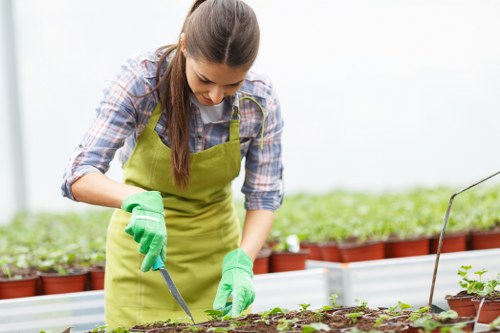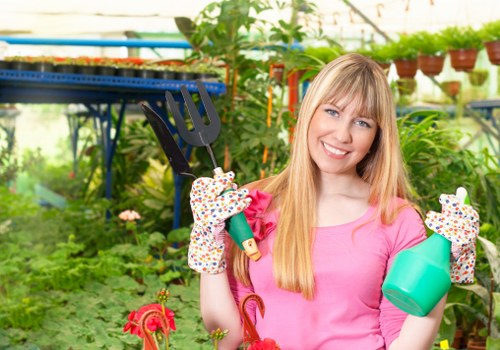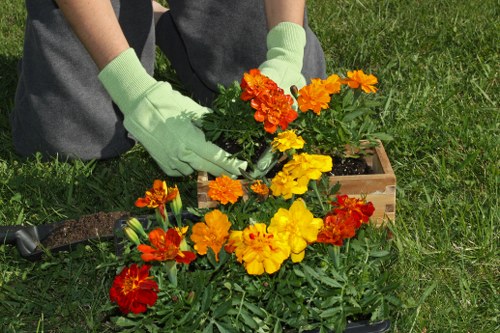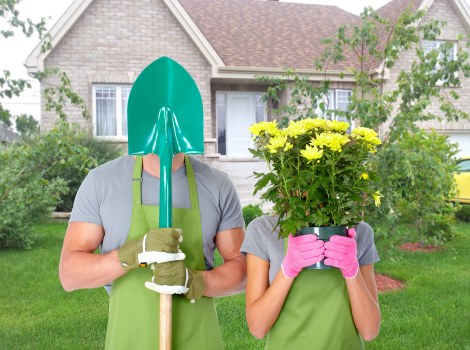Garden Maintenance in Waterloo
Maintaining a beautiful garden in Waterloo requires a blend of knowledge, dedication, and the right techniques. Whether you’re a seasoned gardener or just starting out, understanding the unique climate and soil conditions of Waterloo is essential for thriving plants. This comprehensive guide will walk you through the essential aspects of garden maintenance, ensuring your outdoor space remains vibrant and healthy throughout the year.
Waterloo’s climate presents both opportunities and challenges for gardeners. With its distinct seasons, each requiring specific care, it’s important to tailor your maintenance practices accordingly. From soil preparation in the spring to winterizing your garden, a strategic approach can make all the difference.
Proper garden maintenance not only enhances the aesthetic appeal of your property but also promotes environmental sustainability. By implementing eco-friendly practices, you contribute to a healthier ecosystem while enjoying the benefits of a well-tended garden.

Understanding Waterloo’s Climate and Soil
The first step in effective garden maintenance is understanding the local climate and soil conditions. Waterloo experiences a humid continental climate, characterized by warm summers and cold winters. This variation requires gardeners to select plants that can withstand temperature fluctuations and seasonal changes.
Soil quality is another critical factor. The soil in Waterloo can range from clay-heavy to sandy, each type affecting water retention and nutrient availability. Conducting a soil test can help determine pH levels and identify any deficiencies, allowing you to amend the soil appropriately for optimal plant growth.
Incorporating organic matter, such as compost or manure, can improve soil structure and fertility. This not only benefits your plants but also promotes healthy microbial activity, essential for sustainable gardening.

Seasonal Garden Maintenance Tips
Spring Maintenance
Spring is a crucial time for garden preparation in Waterloo. As the weather warms, it’s the perfect opportunity to plant new flowers and vegetables. Start by clearing any debris accumulated during the winter months and prepare the soil by tilling and adding compost.
Mulching is also essential in spring. Applying a layer of mulch helps retain soil moisture, suppress weeds, and regulate soil temperature. Choose organic mulches like bark or straw for added benefits as they decompose and enrich the soil.
Regular watering is vital as plants emerge from dormancy. Ensure that newly planted areas receive adequate moisture, especially during dry spells. Installing a drip irrigation system can provide consistent hydration while conserving water.

Summer Maintenance
Summer in Waterloo brings longer days and warmer temperatures, which can be both a boon and a challenge for gardeners. Maintaining adequate moisture levels is critical, as plants may experience water stress during heatwaves.
Pruning is another important summer task. Removing dead or diseased branches promotes better air circulation and reduces the risk of pest infestations. Focus on shaping plants to encourage healthy growth and improve overall plant health.
Pest and disease management becomes more prevalent in the summer. Regularly inspect your plants for signs of infestation or illness, and take prompt action using eco-friendly treatments to minimize harm to beneficial insects and the environment.

Autumn Maintenance
As temperatures begin to drop, autumn is the time to prepare your garden for the winter months. Start by harvesting any remaining produce and removing spent plants to prevent disease buildup.
Leaf management is crucial in autumn. Rake fallen leaves and compost them, or use them as mulch to protect plant roots from freezing temperatures. This also helps maintain soil health and structure.
Planting perennials and bulbs in the autumn ensures they establish strong roots before the onset of winter. This practice sets the stage for a vibrant garden in the following spring.

Winter Maintenance
Winter poses unique challenges for garden maintenance in Waterloo. Protecting sensitive plants from frost and heavy snowfall is essential. Use burlap or protective covers to shield delicate foliage and prevent damage.
Tools and equipment should be cleaned and stored properly to prevent rust and deterioration. Regular maintenance extends the lifespan of your gardening tools, ensuring they are ready for use in the next growing season.
Planning for the upcoming year involves assessing what worked and what didn’t in your garden. Take notes on plant performance, design changes, and maintenance practices to refine your approach for better results.
Essential Garden Maintenance Practices
Regular Weeding
Weeds compete with your plants for nutrients, water, and sunlight. Regular weeding is essential to maintain a healthy garden. Hand-pulling weeds or using appropriate tools can keep your garden beds clean and free from invasive species.
Applying mulch not only conserves moisture but also suppresses weed growth. A thick layer of mulch makes it difficult for weed seeds to germinate, reducing the labor needed for weeding.
Pruning and Trimming
Pruning promotes healthy plant growth by removing dead or diseased branches and encouraging better air circulation. Regular trimming shapes plants, enhancing their appearance and preventing overcrowding.
Different plants require specific pruning techniques. Understanding the needs of each plant species ensures effective maintenance and promotes longevity.
Fertilizing and Soil Care
Fertilizing provides essential nutrients that may be lacking in the soil. Choose fertilizers based on the specific needs of your plants, whether it's slow-release granular fertilizers or liquid options for immediate effect.
Soil care involves regularly testing and amending the soil to maintain optimal pH levels and nutrient availability. Incorporating organic matter improves soil structure, making it more conducive to plant growth.
Watering Strategies
Proper watering is critical for plant health. Watering deeply and infrequently encourages deep root growth, making plants more resilient to drought conditions. Early morning is the best time to water, reducing evaporation and allowing plants to absorb moisture before the heat of the day.
Using drip irrigation or soaker hoses ensures targeted watering, minimizing water waste and delivering moisture directly to the plant roots.
Choosing the Right Plants for Waterloo Gardens
Selecting plants that are well-suited to Waterloo’s climate is fundamental for a thriving garden. Opt for native species, which are adapted to the local environment and require less maintenance.
Perennials are an excellent choice for consistent year-round beauty. Plants like coneflowers, hostas, and daylilies not only add color but also attract pollinators, enhancing the ecological value of your garden.
Incorporating ornamental trees and shrubs provides structure and shade, contributing to the overall landscape design. Fruit-bearing trees can offer both aesthetic appeal and a practical harvest.
Eco-Friendly Garden Maintenance
Composting
Composting is an environmentally friendly way to recycle organic waste and enrich your soil. Creating a compost pile with kitchen scraps, leaves, and grass clippings reduces landfill waste while providing nutrient-rich compost for your plants.
Regularly turning the compost ensures proper aeration and decomposition, resulting in high-quality compost that enhances soil fertility.
Water Conservation
Implementing water conservation techniques helps reduce your garden’s environmental footprint. Use rain barrels to collect rainwater for irrigation, and mulch garden beds to minimize evaporation.
Plant drought-resistant species and optimize garden layout to create microclimates that retain moisture. These practices not only save water but also promote sustainable gardening.
Natural Pest Control
Avoiding chemical pesticides is beneficial for both your garden and the surrounding ecosystem. Encourage beneficial insects like ladybugs and bees, which naturally control pest populations.
Using physical barriers, such as nets or row covers, protects plants from pests without harming the environment. Additionally, introducing companion planting strategies can deter unwanted insects.
Hiring Professional Garden Maintenance Services
While DIY garden maintenance is rewarding, hiring professional services in Waterloo can save time and ensure expert care. Professional gardeners bring specialized knowledge and tools, enhancing the health and appearance of your garden.
Services may include regular lawn care, pruning, pest management, and seasonal clean-ups. Professional maintenance ensures that all aspects of your garden are addressed comprehensively.
Choosing a reputable garden maintenance company involves checking credentials, reading reviews, and understanding the range of services offered. Investing in professional care can lead to a more vibrant and well-maintained garden.
Garden Maintenance Tools and Equipment
Having the right tools is essential for effective garden maintenance. High-quality equipment not only makes tasks easier but also ensures precise and efficient care.
- Pruning shears for trimming branches
- Hoes and forks for soil preparation
- Watering cans or hoses for irrigation
- Lawn mowers and trimmers for grass care
- Gardening gloves to protect your hands
Regularly maintaining your tools, such as cleaning and sharpening, extends their lifespan and performance. Proper storage prevents damage and keeps your garden ready for any task.
Creating a Year-Round Garden Maintenance Schedule
Developing a maintenance schedule helps ensure that your garden receives consistent care throughout the year. A well-planned timetable accounts for seasonal tasks and prevents overlooking essential maintenance activities.
- Spring: Soil preparation, planting, mulching, and initial watering.
- Summer: Regular watering, pruning, pest control, and mulching.
- Autumn: Harvesting, leaf management, and planting perennials.
- Winter: Protecting plants, tool maintenance, and planning for next year.
Adhering to this schedule allows you to manage tasks efficiently, ensuring a healthy and attractive garden year-round.
Common Garden Maintenance Challenges in Waterloo
Pest Infestations
Pests can quickly undermine your garden’s health. Common pests in Waterloo include aphids, caterpillars, and slugs. Monitoring your plants regularly and implementing natural pest control methods can keep infestations in check.
Introducing beneficial insects, using neem oil, or setting up physical barriers are effective strategies for managing pests without resorting to harmful chemicals.
Weed Control
Weeds compete with your plants for resources, making weed control a persistent challenge. Consistent weeding, mulching, and using pre-emergent herbicides can effectively reduce weed growth.
Choosing ground covers or dense planting can also minimize the space available for weeds, promoting a cleaner garden environment.
Soil Degradation
Over time, soil can lose its fertility and structure. Regularly adding organic matter, practicing crop rotation, and avoiding excessive use of chemical fertilizers help maintain healthy soil.
Implementing cover crops during off-seasons can prevent soil erosion and replenish nutrients, ensuring long-term garden productivity.
Enhancing Garden Aesthetics
Aesthetics play a significant role in garden maintenance. Thoughtful design and regular upkeep enhance the visual appeal of your outdoor space.
- Incorporate a variety of plant colors and textures for a dynamic look.
- Use garden ornaments and structures like trellises or benches to add character.
- Maintain tidy pathways and borders to provide a neat appearance.
- Regularly deadhead flowers to encourage continuous blooming.
Balancing functionality with beauty creates an inviting and harmonious garden environment that you can enjoy and take pride in.
Sustainable Garden Maintenance Practices
Embracing sustainability in your garden maintenance efforts benefits both your garden and the broader environment. Sustainable practices reduce resource consumption and promote ecological balance.
Rainwater Harvesting
Collecting rainwater for irrigation reduces reliance on municipal water sources and conserves water. Install rain barrels or other collection systems to capture and store rainwater for garden use.
Using harvested rainwater helps maintain optimal soil moisture levels and supports plant health without increasing your water bill.
Native Plant Selection
Choosing native plants is a sustainable strategy as they are well-adapted to the local climate and soil conditions. Native species require less water, fertilizer, and pesticides, minimizing your garden’s environmental impact.
Additionally, native plants support local wildlife, including pollinators and beneficial insects, enhancing your garden’s biodiversity.
Composting and Recycling
Recycling garden waste through composting reduces landfill contributions and creates valuable soil amendments. Compost enriches the soil, improving its structure and fertility, which benefits plant growth.
By repurposing organic waste, you create a closed-loop system that supports sustainable gardening practices.
Technological Innovations in Garden Maintenance
Advancements in technology have revolutionized garden maintenance, making tasks easier and more efficient. Integrating modern tools and systems can enhance the care and management of your garden.
Smart Irrigation Systems
Smart irrigation systems use sensors and timers to optimize watering schedules based on weather conditions and soil moisture levels. This technology conserves water and ensures plants receive the right amount of hydration.
Remote control features allow you to manage your irrigation system from anywhere, providing convenience and efficiency.
Automated Tools
Automated garden tools, such as robotic lawn mowers and smart pruning systems, reduce the manual labor involved in garden maintenance. These tools offer precision and consistency, maintaining your garden effortlessly.
Investing in automated tools can save time and ensure your garden remains well-kept with minimal effort.
Garden Management Apps
Garden management apps help you track maintenance schedules, plan planting strategies, and monitor plant health. These digital tools provide valuable insights and reminders, keeping your garden on track.
Using technology to manage your garden enhances organization and helps you stay proactive in addressing maintenance needs.
Conclusion
Effective garden maintenance in Waterloo requires a combination of knowledge, planning, and the right practices. By understanding the local climate, choosing suitable plants, and implementing sustainable and technological solutions, you can cultivate a thriving and beautiful garden year-round.
Whether you’re maintaining your garden personally or hiring professional services, the key is consistency and attention to detail. Embrace the seasonal rhythms, invest in quality tools, and adopt eco-friendly practices to ensure your Waterloo garden remains a lush and inviting sanctuary.
Ready to transform your garden? Contact us today to book your professional garden maintenance service and enjoy a vibrant, healthy garden all year long!